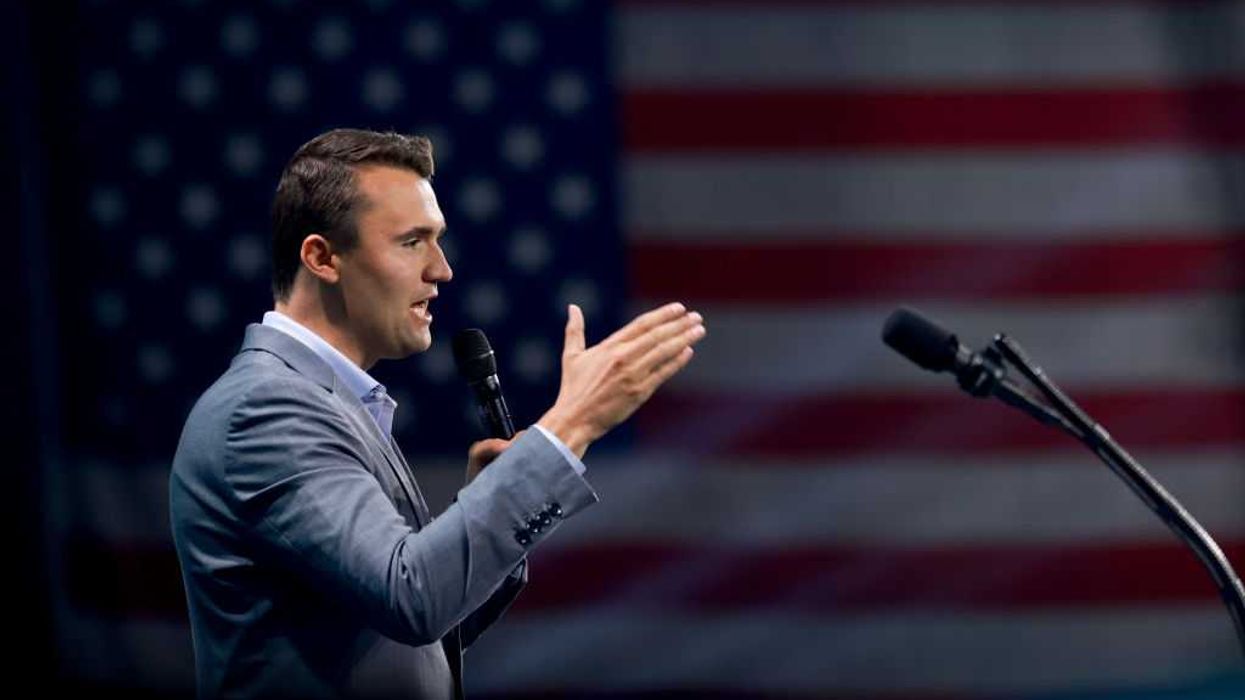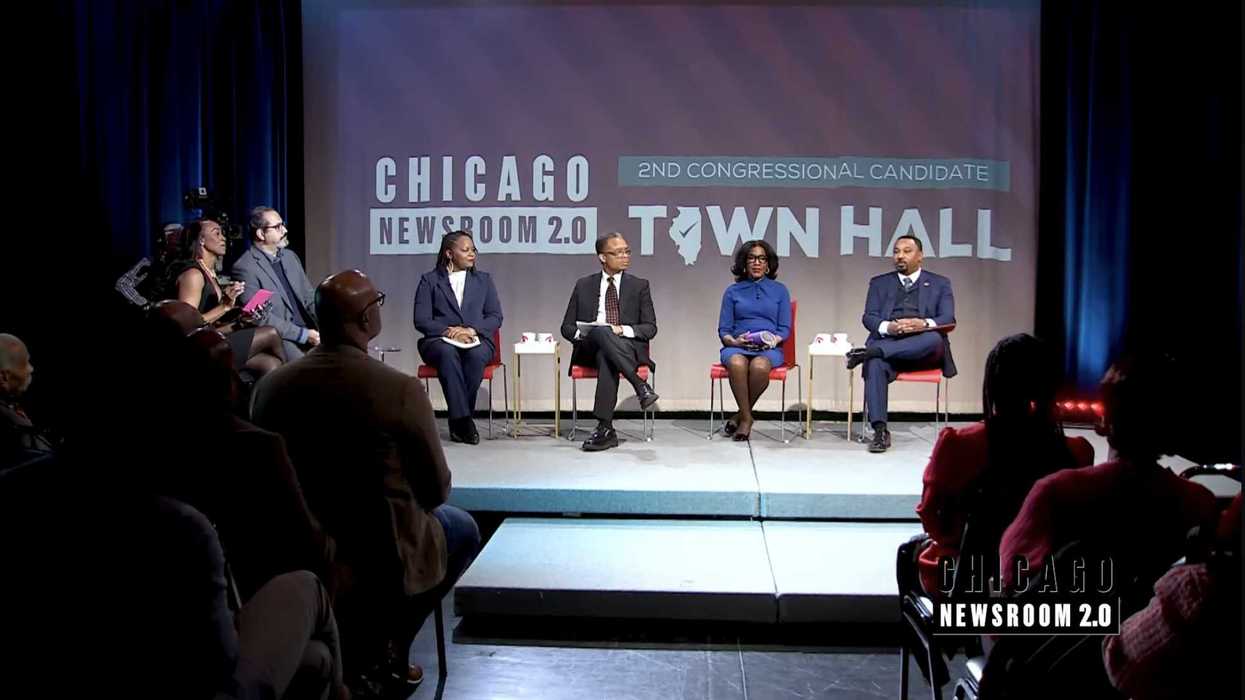Republicans named the bill for the recently murdered right-wing activist.
Who was Charlie Kirk?
On September 10, Charlie Kirk was shot and killed onstage during a debate at Utah Valley University’s campus. The social media personality, The Charlie Kirk Show podcast host, and founder of right-wing advocacy organization Turning Point USA was 31.
He was particularly famous for debating ideological opponents in a heated yet respectful way. Notable examples included California Gov. Gavin Newsom, comedian Bill Maher, and even 25 progressive college students at once, a stunt which has earned 38+ million YouTube views.
President Donald Trump spoke at Kirk’s funeral, attended by a capacity crowd at State Farm Stadium, home of the NFL’s Arizona Cardinals. Trump posthumously awarded Kirk the Presidential Medal of Freedom, accepted by his widow Erika – who also assumed the CEO role at Turning Point and earned widespread praise for her poise following her husband’s death.
The murder suspect turned himself in and is currently awaiting trial. Under Utah state law, he could face the death penalty.
Now, a new bill in Congress is named The Charlie Kirk Act. To fully explain it, though, let’s travel back in time 77 years.
Context: history
In the Cold War era following World War II, the U.S. government financed a large amount of media intended for foreign audiences. From leaflets to books, from radio programs to (possibly) rock songs, the effort aimed to spread American influence and ideals far beyond America’s own borders. Prominent government programs in this initiative included Voice of America and Radio Free Europe.
So in 1948, Congress enacted the Smith-Mundt Act. Nicknamed for its two lead sponsors, a New Jersey Republican senator and South Dakota Republican representative, one of the law’s main provisions banned such government-funded media materials intended for foreign audiences from domestic distribution within the U.S.
The logic, as then-Sen. Edward Zorinsky (D-NE) said in a Senate floor speech: “The American taxpayer certainly does not need or want his tax dollars used to support U.S. government propaganda directed at him or her.”
This domestic prohibition proved controversial even from its early days. “A situation… where American citizens were unable to access the information produced by their own government for foreign consumption,” Helle C. Dale wrote for the USC Center on Public Diplomacy, was “just about unique in the world.”
Indeed, as early as 1967, a federal advisory commission officially recommended removing this domestic distribution ban. But Congress didn’t actually do so until 2013.
By then, the argument had essentially morphed into: virtually nothing is kept off the internet. In the digital era, media broadcast to Azerbaijan (or wherever) could no longer stay reliably confined within that country’s borders anymore, as it could have several decades prior.
Reasoning that federal law should reflect this new reality, Congress enacted the Smith-Mundt Modernization Act in early 2013.
What the new legislation does
On September 12, two days after Kirk’s death, right-wing influencer @Official_Elly_May went viral with a 2-minute TikTok video advocating that government-produced media once again be banned for domestic distribution, as was previously the law from 1948 to 2012. She also recommended the bill be titled “the Charlie Kirk Act.”
Trump reposted the video on Truth Social, supercharging its virality.
Only five days later, on September 17, Sen. Mike Lee (R-UT) did exactly what the video suggested. His Charlie Kirk Act would reinstate a ban on U.S. government-funded media from distributing their content within American borders, as was previously the law from 1948 to 2012.
The Fulcrum was unable to locate a House version with the same “Charlie Kirk Act” title. However, a few weeks later, on October 8, Rep. Thomas Massie (R-KY4) introduced a bill to do the exact same thing, albeit with a duller name: the Repeal the Smith-Mundt Modernization Act.
Why is it named after Charlie Kirk?
The bill’s actual policy connection to Kirk himself is negligible, perhaps even nonexistent.
The Fulcrum was unable to locate Kirk saying anything about 1948’s original law, nor 2013’s revision law, during his lifetime. Kirk certainly railed against what he labeled left-wing “government propaganda” or “disinformation” – see here or here for examples. But it’s unclear that he ever commented on this lesser-known policy, which never seemed to cross his radar.
Besides, the bill would only apply to government-funded outlets such as Voice of America and the U.S. Agency for Global Media. So it wouldn’t actually affect the private sector organizations, pundits, and columnists who have often provided the most controversial comments about Kirk and the circumstances surrounding his death.
For example, Jimmy Kimmel’s ABC comedy talk show was suspended due to his controversial comments about Kirk’s killer – but this bill wouldn’t affect him, nor ABC, at all. MSNBC commentator Matthew Dowd was fired for controversial comments he made about Kirk himself – but this bill similarly wouldn’t affect him, nor MSNBC, either.
What supporters say
The legislation’s supporters argue that the government shouldn’t fund so-called propaganda directed towards its own citizens.
“From the end of World War II until the Obama administration, it was illegal for the U.S. government to use the State Department’s foreign broadcasting apparatus to target American citizens with propaganda. In 2013, these protections were taken away,” Sen. Lee said in a press release. “As Charlie’s vital work so ably demonstrated, Americans can figure out the truth for themselves, without government telling them what to believe.”
The 2013 reform “ended a prohibition on the federal government exposing American audiences to its propaganda. I voted against that," Rep. Massie said in a separate press release. (Fact check: he did in fact, vote against it.) “Taxpayer-funded fake news should not be used by the federal government to wage influence campaigns against the American people."
What opponents say
Opponents of the 2025 repeal bill would be the same people who support 2013’s reform law, which allows government-funded media to distribute domestically in the first place.
So let’s go back to the early 2010s. Several years before that reform’s ultimate enactment, as a small provision amid a giant military spending package, 2010’s standalone version attracted almost exactly equal bipartisan cosponsors: 13 Democrats and 10 Republicans.
“After the earthquake in Haiti, [U.S. government-funded media] provided emergency transmissions in Creole,” Democratic cosponsor Rep. Adam Smith (D-WA9) wrote in a 2012 blog post. “However, an offer from Sirius satellite radio to carry the broadcasts was bogged down by concerns of Smith-Mundt's domestic dissemination restrictions.”
“In another example, Smith-Mundt prohibited a request made by a Minneapolis radio station to replay, in the Somali language, a Voice of America (VOA)-produced broadcast developed for distribution in Somalia,” Rep. Smith continued. “That would have provided fair, accurate, and timely information to the large Somali diaspora” population in Minnesota.
Odds of passage
The current House repeal bill has attracted seven Republican cosponsors. It awaits a potential vote in the House Foreign Affairs Committee, controlled by the GOP.
Though the Senate version technically has zero cosponsors yet, lead sponsor Sen. Lee can probably count on at least one fellow supporter, since he introduced the bill on behalf of Sen. Roger Marshall (R-KS) by request.
The “by request” designation is an obscure procedural move so rare that this is the only congressional bill so far this year to use it, out of several thousand introduced. Indeed, the last time it was used at all appears to be May 2022, a full three and a half years ago.Jesse Rifkin is a freelance journalist with The Fulcrum. Don’t miss his report, Congress Bill Spotlight, on The Fulcrum. Rifkin’s writings about politics and Congress have been published in the Washington Post, Politico, Roll Call, Los Angeles Times, CNN Opinion, GovTrack, and USA Today.
SUGGESTIONS:
Congress Bill Spotlight: Department of War Restoration Act






















 Mayor Ravi Bhalla. Photo courtesy of the City of Hoboken
Mayor Ravi Bhalla. Photo courtesy of the City of Hoboken Washington Street rain garden. Photo courtesy of the City of Hoboken
Washington Street rain garden. Photo courtesy of the City of Hoboken